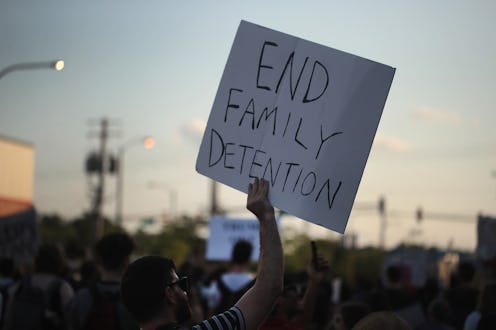News
ICE Released 15 Babies From A Texas Detention Center After Advocates Spoke Out

Last week, migrant rights advocates publicly denounced the "alarming increase" in babies being held in Immigration and Customs Enforcement (ICE) detention. Advocates claimed that the young kids weren't receiving proper medical care and that most of these smallest arrivals to the country were sick in some way. Now, the Pacific Standard reports that ICE has released at least 15 babies from a detention facility in Texas.
At least two babies remain in custody, according to a prior estimate provided by ICE. And as of March 1, the Pacific Standard reported, there were 17 babies under the age of one at the facility in Dilley, Texas, and one more at a facility in Karnes, Texas. A letter from ICE to CBS News on Monday said 12 babies had been released. In an emailed statement to Bustle, ICE wrote that there is only one infant at the Texas facility now, and defended the conditions there:
“As of March 5, 2019, there is one infant under one year old among the family units at the South Texas Family Residential Center. Typically, family units who come into ICE custody at a family residential center and who pass an initial credible fear interview are released from custody in fewer than 20 days.
“Allegations of unsafe and unsanitary conditions at STFRC are utterly false. As detailed in the June 2017 DHS Inspector General’s report, the family residential centers are ‘clean, well-organized, and efficiently run’ and the agency was found to be ‘addressing the inherent challenges of providing medical care and language services and ensuring the safety of families in detention’.”
“In the summer of 2018, ICE held an extensive tour of STFRC for local and national media outlets to demonstrate ICE’s commitment to the health, safety and welfare of the families in our care.”
In a statement to the Pacific Standard, ICE blamed the increased number of babies in its custody on generally high numbers of arrivals at the border with Mexico:
As the number of family units crossing the border into the U.S. has increased, so too has the frequency of those with younger children, including infants, who are being encountered at the border by U.S. Border Patrol and turned over to [ICE]. As such, ICE is seeing an uptick in the number of family units with infants at its family residential centers (FRCs).
In the past, kids under the age of one were hardly ever detained; normally they were released much more quickly, CBS News reported. But at least one infant and mom had been detained for some 20 days, according to a formal complaint written by several advocacy groups to the Department of Homeland Security last week.
The advocates detailed their concerns about the "lack of specialized medical care available" at the facility. "Infants are especially vulnerable to serious illnesses, pain, disability, and even death from preventable infections and diseases," the complaint reads. No children have ever died at Dilley, but there have been cases of young children passing away shortly after release.
Katy Murdza, the advocacy coordinator at the American Immigration Council's Dilley Pro Bono Project, spearheaded the media blitz that drew attention to the young kids. She said that almost every infant she'd seen at the Dilley center — where she's worked for two years — was sick.
"Every mother I spoke to said that her child was sick in some way," Murdza told CBS News. The Dilley facility is the largest family detention center in the country, with room for about 1,520 mothers and their kids, VICE News reported.
Murdz told CBS News that even basic things like accessing formula and bottled water to prepare it were difficult. Neither she nor any of her co-workers drink the tap water there. "It's just really hard seeing all of these very small babies in a detention setting," she told CBS News. Many of the children had reportedly lost weight.
According to the American Academy of Pediatrics, no children should be placed in immigration detention — let alone infants. Instead, the policy suggests that moms and their kids be allowed to live with family in the United States as they await their asylum cases.
Ultimately, that's exactly what happened. Murdza told CBS News that all of the babies who were released went with their moms to family members or friends "ready to buy them a bus or plane ticket and receive them in their home."
Getting the other two babies released — and keeping future infants who arrive at the border out of detention — will remain migrant advocates' focus.
This report has been updated.